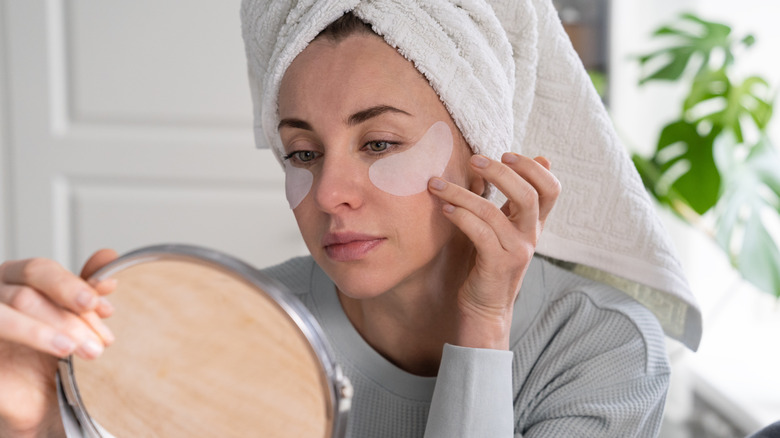5 Tips To Debloat Your Face
Feeling bloated is nothing new. In fact, it has actually become a common wellness trend to address bloating and attempt to find the root cause of it. With social media influencers touting the benefits of their "debloat smoothies" or detox juice cleanses, bloating can often be misconstrued as simply feeling full or having your stomach slightly expand after a meal.
According to the Cleveland Clinic, actual bloating in your stomach is usually a painful type of fullness that relates to an underlying problem in your gut. Poor digestion can be caused by health issues like leaky gut or irritable bowel syndrome, but other lifestyle factors like stress levels and diet can play a role.
Interestingly, bloating in your face is slightly different because it relates to an overall feeling of puffiness. There are many reasons why your face might be feeling swollen but oftentimes it is largely related to diet or lifestyle choices. The good news is that once you understand the factors that are causing the puffiness in your face, you can start making changes to debloat it.
Stay out of the heat
You may notice that your face feels bloated after a long day in the sun. This is likely because your blood vessels enlarge when your temperature rises in order to keep fluid moving through your body. Of course, a picnic at the park, a family trip to Disneyland, or a day at the zoo can all be really fun activities. However, they typically involve a lot of sun exposure.
While vitamin D is considered the sunshine vitamin, too much of it can lead to bloating. Therefore, breaking up your sun exposure by sitting in the shade frequently, wearing a hat, or even cooling yourself down with a fan or wet cloth can all help to debloat your face.
According to Healthline, doing a little facial massage is a great way to "stimulate blood flow" and reduce the look of swelling. Taking ibuprofen or aspirin can also help to fight the inflammation in your face. Plus, after a long day in the sun, applying topical creams can be very soothing. Specifically, look for a lotion with aloe vera in it because this plant does wonders for your skin's health and helps to fight bloat.
Remain hydrated throughout the day
According to the National Library of Medicine, most people don't drink enough water throughout the day, with 75% actually being dehydrated. Living in a chronically dehydrated state can begin to feel normal if that's what your body has gotten used to. However, it can actually take a toll on your face and skin.
Pure Luxe Medical explains how dehydrated skin can lose the ability to stretch and keep its shape. Propper hydration not only reduces the look of fine lines and wrinkles, but it helps your skin hold onto that water. While it may seem counterintuitive to debloat your face while encouraging hydration in your skin, it's actually the dehydration that can lead to a swollen-looking face.
Your blood vessels get bigger when you are not hydrated enough, which causes the body to try and retain fluid. This can lead to a bloated-looking face and overall puffiness. There's a reason why you crave salt when you're dehydrated. On the other hand, remaining properly hydrated throughout the day allows the cells in your body to let go of that excess water they were holding onto, which will ease the bloating in your face.
Know what foods to avoid
Another way your face can become puffy or bloated is by consuming excess amounts of salt because the sodium causes your body to retain liquid. You may notice that your face or body feels a little swollen after certain meals or snacks that are highly processed, like cured meats, chips, or even instant noodles.
Not only is this due to the large amounts of sodium in these items, but refined carbohydrates can also cause your body to hold on to water, leading to bloating. On top of these snack foods, consistently eating meals that contain fried foods or drinking alcohol can all lead to inflammation in your body due to an increase in C-reactive protein (CRP).
According to MedicineNet, there are quite a few foods you should limit if you are trying to combat facial bloating. If you are eating high-inflammatory foods frequently, it would be beneficial to switch over to more whole food-based meals regularly and see how your bloating decreases. It's also recommended to drink a lot of water when you do go out for a drink or indulge in those salty, fatty foods because that extra hydration helps to combat bloating.
Find a workout routine you can stick to
It's not surprising that regular exercise is beneficial for your overall health, but it can also have a direct effect on the bloating in your face because of how much sodium you lose in your sweat. According to Health, doing physical activity to the point of breaking a sweat can do wonders for the swelling or puffiness in your face.
While losing weight, in general, may slim the look of your face, it's beneficial to know how you can tell if it's bloating or fat. If your bloating is due to water retention or excess salt from your diet, sweating it out can be really helpful because you lose sodium when you sweat. While exercising at any time of day can be beneficial, Byrdie explains why a morning gym session can be particularly useful for those who constantly wake up with a bloated face.
Sleeping through the night usually requires long stretches of motionlessness in a flat position which can cause your face to look extra swollen in the morning. Many people want to know how to prevent morning bloating and simply adding an extra pillow to your bed is another way to keep your head more elevated. In addition, heading straight to the gym is a great way to increase that circulation.
Create the ideal nighttime routine
Since facial bloating is such a common occurrence in the morning when you first wake up, there are some steps that you can implement in your nighttime routine that can help to mitigate that happening. Since hormones actually play a huge role in the inflammation in your body, taking extra steps to ensure your hormones are balanced is essential.
There are many spices that help decrease inflammation, and drinking herbal teas before bed not only helps to support a good night's sleep but can improve your hormonal health. Chamomile is a great option because it contains the amino acid glycine, which has been touted as a natural remedy for menstrual cramping. Regulating your hormones can play a big role in how well you sleep and getting enough rest has also been linked to a reduction in facial bloating.
Since stress can actually increase the inflammation in your body and hinder your sleep as well, drinking a melatonin supplement with warm water before bed can help you fall asleep and stay relaxed. Similarly, a splash of cold water can relax your body and improve your mood, making it easier to fall asleep. Therefore, washing your face with cold or cool water before going to bed not only helps to clean your skin and clear your pores but the cold temperature actually reduces swelling in your face by shrinking the blood vessels. Ultimately, there are many ways to debloat your face but understanding the root cause of your bloating can help to guide the approach you take.





